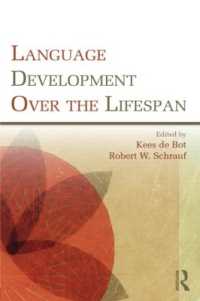- ホーム
- > 洋書
- > 英文書
- > Computer / General
Full Description
This book constitutes the proceedings of the International Congress of Computer Science, CORE 2025, Mexico City, Mexico, during October 2025.
The 23 full papers included in this book were carefully reviewed and selected from 61 submissions.
The CORE 2025 Congress continues a 24-year tradition of bringing together the research community of the Centro de Investigación en Computación (CIC) to discuss cutting-edge developments in computing. This edition focuses on sustainability, highlighting how computational sciences, including Artificial Intelligence (AI) contribute to environmental protection and sustainable development. The congress serves as a platform for showcasing technological advancements, innovative research, and interdisciplinary collaborations that drive sustainable solutions and address global challenges. By addressing both technological progress and social inclusion, CORE 2025 aims to inspire new research directions, foster a collaborative environment, and promote long-term, impactful change for tackling global sustainability challenges through computing.
Contents
.- High-performance systems and technologies.
.- U-Net Based Active Matter Time Evolution.
.- Implementation and Comparison of FIR Digital Filters on DSP and FPGA.
.- Information science and technology.
.- Real-Time Sheet Alignment in Mobile Devices Using Reference Mark-Based Elements.
.- Fine-Grained Insights Generation based on Semantic Clustering from Online Reviews.
.- Rapid Upper Limb Assessment Based on Fuzzy Logic and a Bluetooth Low Energy Sensor Network.
.- Understanding Functional Impairment inRheumatoid Arthritis: A Data-Driven Approach Using HAQ-DI and Clinical Metrics.
.- Data Lakehouse for Type 2 Diabetes Remission: Scoping Review and Architectural Proposal.
.- Artificial Intelligence and Scientific Computing.
.- A Bio-Inspired SN P-Based Visual Cryptographic for Binary Data Hiding in Digital Images.
.- Quantum Associative Classification Model Using Amplitude-Encoded Feature Similitude.
.- Physics-Informed Neural Networks for Approximating the Solution of the 1D Poisson Equation.
.- Modeling the Diffusion Equation with Physics-Informed Neural Networks (PINNs) and Artificial Neural Networks (ANNs).
.- Fuzzy Inference Systems with Evolutionary Optimization for Timely Harvest Prediction: A Case Study.
.- Impact of Binarization on the Performance of Associative Memories in Machine Learning.
.- An Integer Quadratically Constrained Program for the Firefighter Problem: an Empirical Evaluation.
.- BREX: Blend of Ranked-sequential Algorithms Executed for boosting-based classification applied to wine dataset.
.- Impact of Data Augmentation Applied to Fundus Im-ages Used in a Swin
Transformer V2-Based Model for the Detection of Age-Related Macular Degeneration.
.- Development and Evaluation of a Classification Model for Parkinson's Disease
Detection Based on Ensemble Learning and Comparative Feature Selection Strategies.
.- YOLO Meets Tlaxcala: Toward Real-Time Urban Object Detection for Assistive Technology.
.- EEG Conformer for Inner Speech Limitations in Model Transferability and Mitigation Strategies.
.- Analysis of Conversations in Adults Using Multimodal Data Processing.
.- Application of Natural Language Processing Techniques for the Classification and Recommendation of University-Level Mathematical Content.
.- Enhancing English-Urdu Machine Translation Using Transfer Learning.
.- Authorship Attribution in a Scientific Papers by Syntactic and Semantic Textual Representations.







